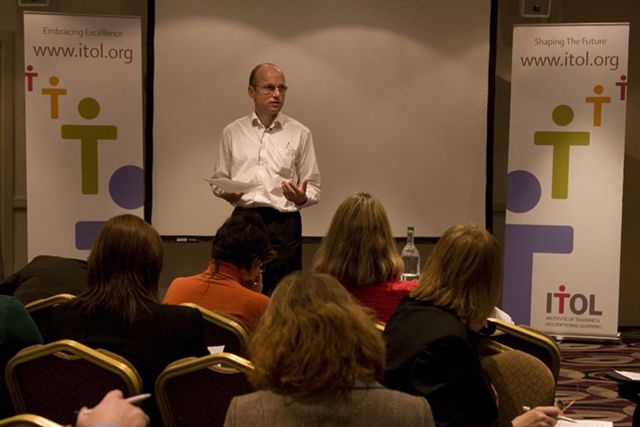How
physical movement can assist learning and
change when reviewing.
WORKSHOP
OUTLINE
Starting
point: If
people retreat to a
'comfort zone' during the reviewing process (e.g. by
sitting in the
same chair
all the time) it can seem as if they are stuck in the
same place -
physically
and mentally. Physical movement can assist mental
movement.
Ideas
to
explore:
- making
reviewing a physical journey as well as a mental
journey
- applying the concept of
the 'stretch zone'
to the reviewing process itself
- making a journey (on
land or water) that
supports mental reviewing processes
- using a physical
language of space and
movement that reflects the language we use
(e.g. ups and downs for emotions, standing on an
issue, feeling in or
out of a group, being pulled in different
directions, experiencing
force fields in a physical way, juggling, balancing
...)
Active
experimentation:You
will be
encouraged to explore these and other possibilities in
active ways in
order to
generate a physical language that intuitively makes
sense to learners.
This
workshop is a mixture of old and new ideas, my ideas
and your ideas. I
would
love to learn about any research or practice that
helps to build this
physical
language.
NOTES
Space:
A businessman has for many
years
walked his dog in the countryside as a way to recover
from the stresses
of work
and sort out his thoughts. Restrictions on access to
the countryside
(during the
foot and mouth disease epidemic) have been limiting
his physical and
mental
movement. For mental space he needs physical space.
Gestures: Don't be embarrassed
smiling,
frowning and making gestures while talking on the
phone. The other
person can't
see your smiles, frowns and gestures - but you think
more clearly and
express
yourself more clearly when your mind, voice and body
are working
together in a
co-ordinated way. Who says the other person can't see
your smile
anyway? Try
sounding happy when you are frowning. Try sounding
miserable when you
are
smiling.
Walking: On television news people
are
shown walking before we see their talking heads. News
reporters are
often shown
walking towards the camera as they talk. Why? Perhaps
we are better at
taking in
information from talking heads when they are on moving
bodies? Perhaps
it is
easier for people to communicate when they are walking
and
talking?
Frozen: Picture a course
participant sat
in a chair, leaning back from the group, legs crossed,
arms crossed,
eyes
crossed and frowning. Is there any chance that they
are open to
listening or
open to learning?
Unfrozen:
Picture another course
participant, leaning forwards, on their toes, eyes and
body moving to
follow the
conversation, head nodding, looking open and relaxed.
They are clearly
more
engaged and more open to learning.
Body
Language: Everyone can
read
body
language. What about 'writing' body language? How can
we get people to
move in
ways that help them communicate and learn? Can we
develop physical
'languages'
that improve the speed, quality and ease of
communication and learning?
Let's
get moving!
